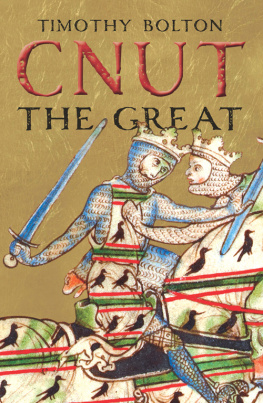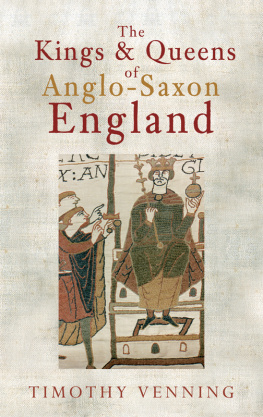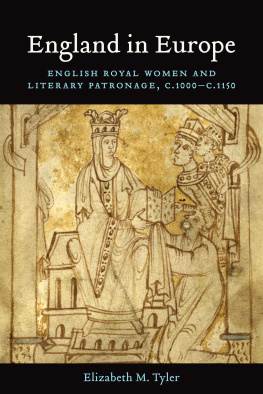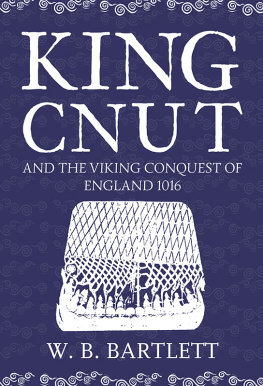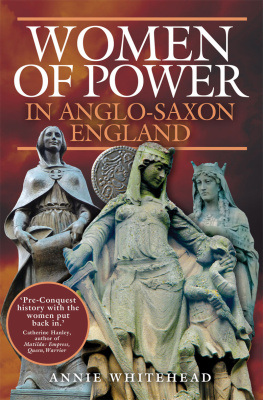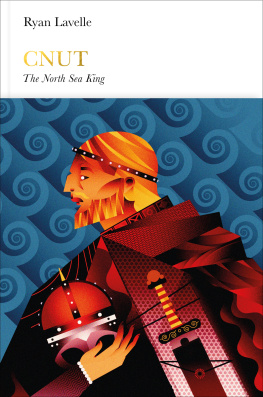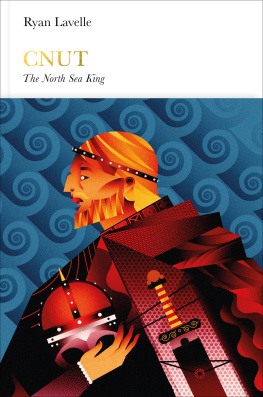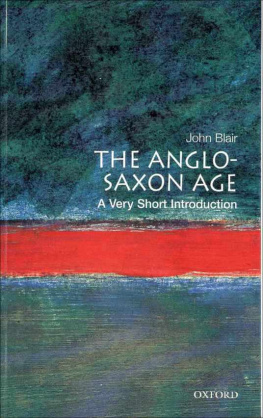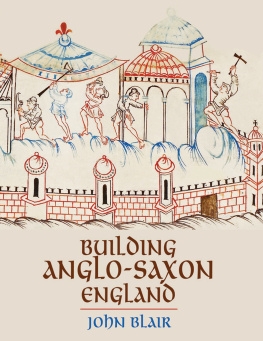CNUT THE GREAT
Also in the Yale English Monarchs Series
THELSTAN by Sarah Foot
EDWARD THE CONFESSOR by Frank Barlow
WILLIAM THE CONQUEROR by David Bates
WILLIAM RUFUS by Frank Barlow
HENRY I by Warren Hollister
KING STEPHEN by Edmund King
HENRY II by W. L. Warren*
RICHARD I by John Gillingham
KING JOHN by W. L. Warren*
EDWARD I by Michael Prestwich
EDWARD II by Seymour Phillips
EDWARD III by W. M. Ormrod
RICHARD II by Nigel Saul
HENRY IV by Chris Given-Wilson
HENRY V by Christopher Allmand
HENRY VI by Bertram Wolffe
EDWARD IV by Charles Ross
RICHARD III by Charles Ross
HENRY VII by S. B. Chrimes
HENRY VIII by J. J. Scarisbrick
EDWARD VI by Jennifer Loach
MARY I by John Edwards
JAMES II by John Miller
QUEEN ANNE by Edward Gregg
GEORGE I by Ragnhild Hatton
GEORGE II by Andrew C. Thompson
GEORGE III by Jeremy Black
GEORGE IV by E. A. Smith
* Available in the U.S. from University of California Press

Copyright 2017 Timothy Bolton
All rights reserved. This book may not be reproduced in whole or in part, in any form (beyond that copying permitted by Sections 107 and 108 of the U.S. Copyright Law and except by reviewers for the public press) without written permission from the publishers.
For information about this and other Yale University Press publications, please contact:
U.S. Office:
Europe Office:
Set in Baskerville by IDSUK (DataConnection) Ltd
Printed in Great Britain by Gomer Press Ltd, Llandysul, Ceredigion, Wales
Library of Congress Cataloging-in-Publication Data
Names: Bolton, Timothy.
Title: Cnut the Great / Timothy Bolton.
Description: New Haven : Yale University Press, 2017.
Identifiers: LCCN 2016046797 | ISBN 9780300208337 (cloth : alk. paper)
Subjects: LCSH: Canute I, King of England, 995?1035. | Great BritainHistoryCanute, 10171035. | Great BritainKings and rulersBiography. | DenmarkKings and rulersBiography. | NorwayKings and rulersBiography. | DanesEnglandHistory.
Classification: LCC DA160 .B649 2017 | DDC 942.01/81092 [B] dc23
LC record available at https://lccn.loc.gov/2016046797
A catalogue record for this book is available from the British Library.
10 9 8 7 6 5 4 3 2 1
This book is dedicated to the memory of my dear friend Raymond
Ian Page (19242012), who taught me that with warmth and charm
our shared traits of pedantry and curmudgeonliness can be powerful
tools rather than social drawbacks.
CONTENTS
PLATES
PREFACE AND ACKNOWLEDGEMENTS
The student of medieval manuscripts has often the words of John Cotgrave in mind: That the reading of many Books is wearinesse to the flesh, when there were none but Manuscripts in the world: How much is that wearinesse increased since the Art of printing has so infinitely multiplyed large and vast volums in every place that the longest life of a man is not sufficient to explore so much as the substance of them. Having produced in 2009 a monograph that studied the mechanisms by which Cnut the Great came to power in England and Scandinavia in the first few decades of the eleventh century, I accepted the offer of Yale University Press to write this book, and find myself now offering the reader a similarly lengthy biography of him. I think that one must have good reason to foist two books or more on the world, and especially so if their subjects are so close to each other. Thus, I beg the indulgence of my readers one more time, and give them my solemn promise that there will not be a third book on Cnut from me.
In 2009 I faced a crucial challenge when writing in English about historical figures from both England and Scandinavia in that, as I said then, it is difficult to select a consistent principle by which these names should be spelt. Anglicised spellings, whether modern or medieval, often distort Scandinavian names so that they become almost Cnut, Harthacnut, Harold Harefoot and Thorkell the Tall will appear as here. Furthermore, in order to differentiate between Cnuts first wife, lfgifu of Northampton, and his second wife, Emma (who took the name lfgifu during her marriage to thelred in the opening years of the eleventh century, and is referred to by both names in the sources), I will exclusively use the names lfgifu and Emma respectively to differentiate them here.
There are a number of letters or characters that may be unfamiliar to my reader, but were common in Old English and Old Norse. Chief amongst these are Thorn and its lowercase form , and Eth and its lowercase form , which are both pronounced as Modern English th. Thus the common Old Norse name rkell is pronounced Thorkell. For the pronunciation of other unfamiliar symbols the reader is directed to the various academic textbooks intended to help the student learn Old Norse or Old English.
In addition, as some sources have been edited and translated more than once, and readers in various countries may have easier access to any one of these, I have used here a system of reference to primary sources in which I cite the place within the source text in its original language first, followed by the editor of the edition used by me in brackets, as well as the page reference there. Translations mostly follow the relevant editions cited by me, with occasional adaptations for sense. These are recorded in the notes.
All tasks this large incur substantial personal debts. I would like to thank Yale University Press, and from my perspective its charming and patient representatives in Heather McCallum and Rachael Lonsdale, for placing their trust in me and asking me to undertake this study. They asked for a study that could add something to scholarship as well as be read by the man on the Clapham omnibus, and I hope I have lived up to their expectations. As part of this I have consciously returned to the style of Barlow, in his seminal biography of Edward the Confessor. In doing so, I have kept citation in the original to a minimum. It is a happy coincidence that most sources cited in translation for the present task are in unambiguous language, but where the original reading might be easily called into question, I have given that as well in the main text. I also wish to offer my thanks to Richard Mason, whose eagle eye saved me from potentially disastrous errors.
Many others are owed especial thanks, including Michael Benskin, Ian Davis, David Dumville, Roxana Kashani, Kari Maund (many times), Camilla Previt, Peter Stokes and Mary Wellesley, for either listening to and salving my panics on so many occasions or for blocking the slings and arrows of this world to give me the necessary space to work on this book. My wife Ingela and my young son Harald tower over all of these in their patience and fortitude in the face of a book project that grew and grew, demanding far too much of my time and ending some weeks after the recent birth of our daughter (and his sister) Estrid, not a few weeks before as I had promised and to them I must offer the greatest thanks, and also apologies.
Timothy Bolton
Stockholm, 2016
Cotgrave, The English Treasury of Wit and Language, published 1605; the text here is from the second page of the unpaginated and unfoliated introduction entitled To the Courteous Reader.
Bolton, Empire, p. xi.
This topic was a perennial debate between me and Ray Page, who usually expounded on the terrible effects of adopting normalized West Norse (and usually Icelandic-influenced) forms of names in source editions. I am not sure that I agree that this is one of the worlds chief ills, but I have never been able to shake off the thought that he may have been, in part at least, correct to point this out. See, for example, the form of Swen Estrithssons name in West Norse sources: Sveinn strarson. This is a form I have used in some publications for the sake of the rule, but cannot get comfortable with.
Next page
